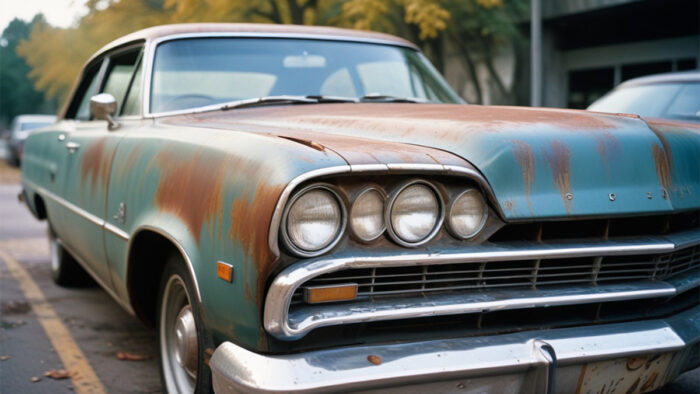Car insurance, also known as auto insurance, is designed to offer financial protection against potential losses and damages to your vehicle. However, the coverage options for this type of insurance differ among insurance providers and policies. This leads to asking one of the most common questions among car owners: does car insurance cover rust damage?

Undoubtedly, vehicle rust can affect the overall safety of the owner as well as its structure. Therefore, its coverage under auto insurance is quite complicated. In this article, you will find the answer to this question as well as some tips that can help you reduce rusting. With this in mind, let us delve into it.
Does Car Insurance Cover Rust Damage?
Car insurance does not typically cover rust damage. This is because rust is viewed as a result of poor maintenance or wear and tear, and a standard car insurance quote does not cover both perils.
In other words, poor maintenance and wear and tear are exclusions from an auto insurance policy. However, there are certain situations where auto insurance may cover damage associated with rust if it is part of its covered events.
When Does Car Insurance Cover Rust Damage?
Auto or car insurance might offer rust damage coverage in certain scenarios, which include:
- Collision or Comprehensive Claims: If your car was involved in an accident that caused it to rust, like water influx from a crash that was not repaired properly and caused rust, your collision or comprehensive coverage may reimburse for the repairs.
- Corrosion as a result of a manufacturing defect: If the rusting was caused by a manufacturing error or defect and your car’s warranty is still active, the manufacturer or producer will be liable for the repair costs.
When Does It Not Cover Rust Damage?
Rust damage is not usually covered by car insurance if any of the following happens:
- Normal Aging and Wear and Tear: The slow decline of rust as time goes on is viewed as normal wear and tear, and this peril is not covered by a standard car insurance policy.
- Environmental Factors: Long-term exposure to harsh climates without adequate care can lead to the vehicle rusting.
- Negligence: Inability to maintain and take care of the vehicle can lead to rust damage, and this is not covered by auto insurance as well.
How to File a Claim Against Rust
Filing an auto insurance claim against rust damage can be daunting because rust is considered an issue as a result of lack of maintenance and wear and tear, which is not generally covered by a standard car insurance quote.
However, there are a few instances where rust damage is covered by car insurance, like if it is caused by a particular covered event, for instance, flood damage. This means that you are qualified to file a claim. Here are the steps you need to take to carry out this process:
- Review your policy.
- Document the damage.
- Reach out to the insurance company.
- Fill out the claim form.
- Time for an insurance adjuster inspection.
- Receive repair estimates.
- Follow up on the procedure.
- Review the final decision.
- Maintain your car to avoid rust.
Make sure you understand your policy details and have practical expectations to prevent claim denials.
How to Avoid Rust
When it comes to retaining the value of your car as well as its appearance and structure, avoiding rust is important. Here are some helpful tips you can use to prevent these metal eaters from destroying your car:
- Keep your car clean.
- Rustproofing treatments.
- Thoroughly dry your car.
- Make use of the car cover.
- Regular inspection.
- Park smart.
- Use a dehumidifier.
- Fix the paint chips fast.
By controlling the humidity and using these practices, you will significantly mitigate the chances of rust and increase the value and life of your car.
FAQs
Can I add coverage to my policy for rust damage?
Generally, it is impossible to include or add certain coverage for rust damage to a car insurance policy. This is because this form of damage is seen as a maintenance issue. Nevertheless, make sure you have comprehensive coverage, as it may offer some form of protection against rust.
Is rust damage considered when assessing a car’s value for insurance purposes?
Yes, damage caused by rust can affect the value of your car negatively for insurance reasons. The overall value of your car and its structure can be decreased by extensive rust. Moreover, insurance providers evaluate the value of your car when determining the premium amount.
How often should I check my vehicle for early signs of rust?
It is advisable to check your car for signs of rust at least twice a year, especially in the fall and spring. Thus, if you reside in areas or places that are high in humidity, regular inspections are even more important. In addition, focus on the wheel wells, undercarriage, and other places where water may gather. When you detect rust early, it will cost less to repair and be easier to manage.



